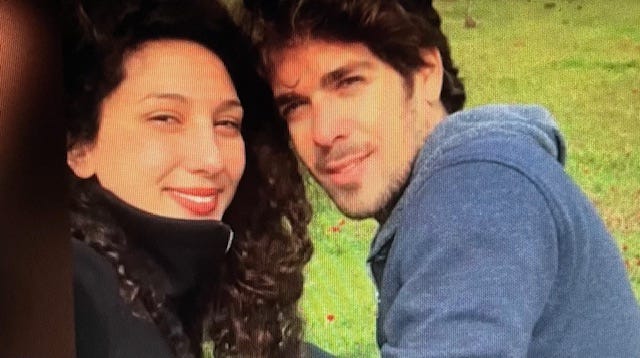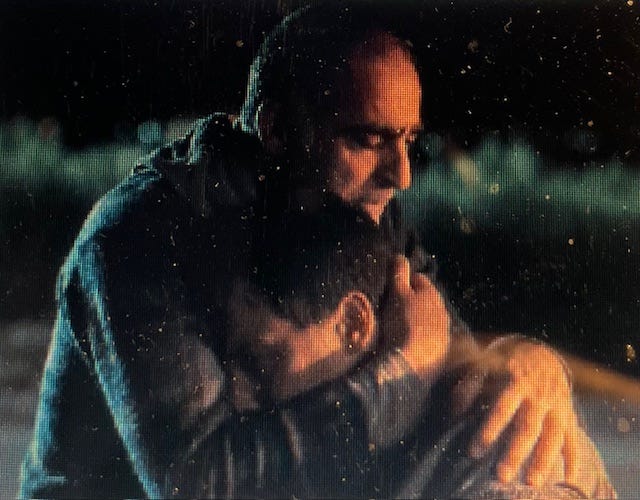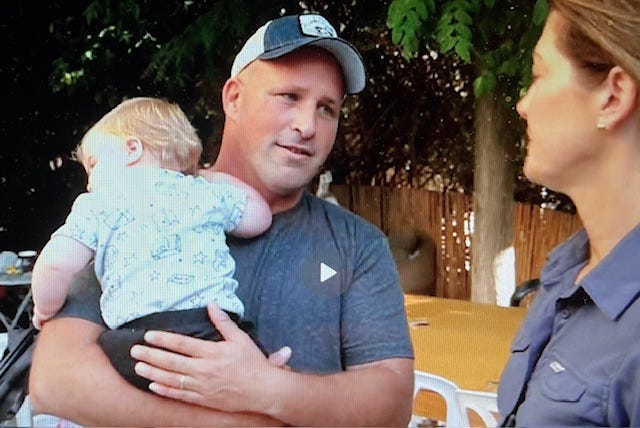‘95 Percent Paradise, Five Percent Hell’
A special January 16 program at JCC Manhattan will explore the impact of October 7 on one family’s life on kibbutz in the south, and honor the haunting work of a promising young filmmaker.
Partners in work and in life: Filmmakers Yahav Winner and his wife, Shaylee Atary.
Why would several thousand Israelis choose to live within a couple of miles of Gaza?
It’s a question many of us have asked ourselves since the horror of October 7.
Yahav Winner, a 36-year-old actor and filmmaker who grew up in Kfar Aza, a community of about 750 people three miles from the Gaza border, lived in Tel Aviv for many years. But he moved back to the kibbutz in recent years, intrigued by both the idyllic setting and the inherent danger looming nearby.
A few months ago he used Kfar Aza as the setting for a 25-minute film he wrote and directed, explaining that it was intended to explore “the trauma of the residents of Israel, and also the constant conflict that exists in you when you look over the fence to see what is happening in Gaza.”
The film, titled simply “The Boy,” is an evocative account of a young man’s deep anxiety when Code Red sirens warn the kibbutzniks of impending rocket fire. The film experience becomes all the more haunting on learning Winner’s fate on October 7. When Hamas terrorists broke into his home, he was able to hold them off long enough for his wife, Shaylee Atary, and three-week-old child, Shaya, to escape. They survived, but Yahav was missing. At first his family believed he was taken hostage in Gaza with more than 200 others, but they later learned he was murdered that fateful day.
“The bloody conflict is traumatic,” Yahav told an interviewer while making the film, “because it has no solution.”
Father and son: An emotional scene from Winner’s last film, “The Boy.”
A Film And A Conversation
In an effort to bridge the emotional gap between American Jews and Israelis during this dark and difficult time, a special program will be held Tuesday, January 16 at 6 p.m. at the Marlene Meyerson JCC in Manhattan, honoring Winner’s memory. “The Boy” will be screened, along with other short clips, and relatives of Yahav will take part in conversation – some in person and some via video from Israel – underscoring the impact of the Hamas attack on a family, a community, a nation and a people … a story of tragedies and miracles.
The violence from Gaza changed Yahav’s life in 2008, when he was 21. He was “working in the garden of his best friend’s father when a Hamas-fired rocket landed and blew the other man to pieces,” according to an article on Yahav and his last film in The New Yorker (“A Murdered Israeli Filmmaker’s Prophetic Warning, In ‘The Boy,’” October 27). At that point, “his soul broke,” said Yahav’s wife, Shaylee, an actor and filmmaker. “His trauma started there,” she noted, and it became a major theme in his work.
The genesis of the JCC program came from an emotional meeting that Gideon Taylor, president of the Conference on Jewish Material Claims Against Germany (Claims Conference), had two months ago with Holocaust survivors at a nursing home in Ashkelon, in the south of Israel. He was especially moved by his conversation with a resident, Yosef Winner, who told him how after surviving the concentration camps, building a new life and raising a family in Israel, he lost a grandson, Yahav Winner, a granddaughter, Hadar Berdichevsky, and her husband, Itay, on October 7, murdered at Kfar Aza.
(Miraculously, Hadar and Itay’s twin sons, 10 months old, survived the ordeal and after 14 hours alone and unattended to, were saved by an Israeli rescue team.)
Reflecting on the loss of his two grandchildren on Israeli soil after his surviving the Holocaust, Yosef told Taylor that he found himself “exhausted, in despair, sinking.”
“I came away with a sense of both the immense pain and incredible resilience” of Yosef Winner, and so many like him throughout Israel, and particularly those in the south who suffered losses that terrible day, Taylor told me. He decided to “bring the story” back home so that American Jews can better understand the depth of suffering Israelis have experienced these last three months. “It will connect us with a remarkable family” that represents “what Israel is about,” in terms of how they emerged from a tragic ordeal with their commitment to the Zionist ideal intact.
Taylor said he chose the medium of film for the program because its “images, stories and voices help us understand a place and a state of mind.”
A Peaceful Life Shattered
That place in particular for Yahav Winner and many others was the south of Israel. Dvir Rosenfeld, 40, a cousin and close friend and neighbor of Yahav, lives in Kfar Aza with his wife, Maya, 39, and their one-year-old son, Ziv. They have described life there as “95 percent paradise, five percent hell.”
Dvir is a civil engineer who grew up on the kibbutz and loved going to the beach in Gaza as a youngster. Maya is from Tel Aviv but was drawn to the beauty of the area around Kfar Aza and the close-knit relationships among those on the kibbutz. (Four of Dvir’s five siblings lived on the kibbutz, and five babies from among them were born within seven months.)
Describing a miracle: Dvir Rosenfeld tells CBS correspondent Norah O’Donnell how his 10-month-old twin nephews were found alive after their parents were murdered in the October 7 Hamas attack at Kfar Aza.
Dvir and Maya, who will participate in person at the January 16 event, say life on the kibbutz was peaceful except at those times when the ongoing conflict between Israel and Hamas escalated.
“The terror rockets” from Gaza “were hell, and when they came, people would pack up and get away for a few days, and come back when things quieted down,” Maya told Bari Weiss on a recent segment of Weiss’s podcast, “Honestly.” But for the most part, people on the kibbutz lived quiet lives, were sympathetic toward Gazans living under the Hamas regime, and kept their doors unlocked at night.
The rhythm of that familiar routine, and every other aspect of Jewish life in the region – and the country – was shattered on the morning of Oct. 7, when thousands of Hamas terrorists launched the barbaric attack whose details are all-too familiar to us now.
At least 65 residents of Kfar Aza were murdered in the massacre, and another 18 were taken hostage. Dvir, Maya and their son survived, having endured 24 hours of terror, huddled in their small, humid safe room with no food, water or electricity before being rescued by the IDF. Many of those who were killed were their friends, neighbors and loved ones, including Hadar and Itay, Dvir’s younger sister and her husband, the parents of the surviving twins.
Dvir and Maya have been in the U.S. for the last month, along with 11 other Israelis from the south whose family members were either murdered or taken hostage by Hamas. The purpose of the privately sponsored trip is to urge world leaders and people of good will to do everything possible to keep the plight of the hostages in the news so that they will not be forgotten.
Soon Dvir and Maya will return to Israel, though they no longer have a home or community to come back to. They acknowledge they can’t even think about the prospect of returning to Kfar Aza anytime soon, but they definitely plan to remain in Israel. “That’s where our families are, and Israel is the only Jewish state.”
They say they will be busy raising their child and helping to raise their orphaned nephews, who are now a year old. “We will tell our story and of the bravery of Hadar and Itay, and of Yahav,” Dvir told me this week, “and we will keep the videos and the articles so that when the children are old enough, they’ll know” who their parents were – and of the ultimate sacrifice they made so that their children, and the story of the Jewish people in Israel, will go on.
Details of the event are HERE.
The program is sponsored by The Claims Conference in partnership with The New Yorker, the USC Shoah Foundation and the following local area synagogues, representing all denominations: Anshe Chesed, B’nai Jeshurun, Central Synagogue, Kehilath Jeshurun, Darkhei Noam, Hebrew Institute of Riverdale-The Bayit, Romemu and the Society for the Advancement of Judaism.
Admission is a nominal charge of $5, and attendees are asked to contribute to a special fund set up by Migdal Ohr. All tax-deductible donations will go directly towards helping the Winner and Rosenfeld families and other families directly impacted by the October 7 attacks.






